NewsBeat
Israel seizes Golan buffer zone after Syrian troops leave posts
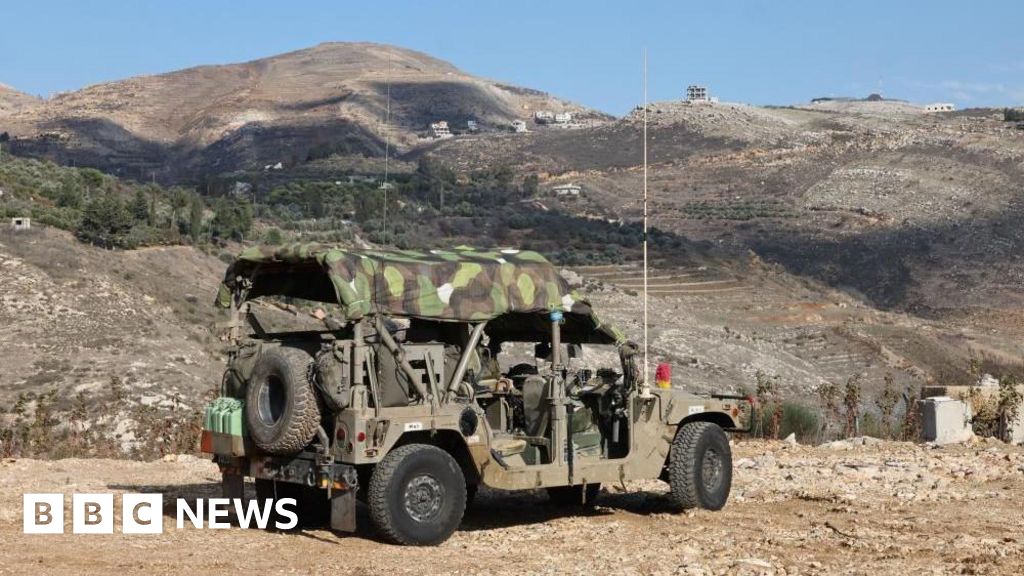
Israel’s prime minister has announced its military has temporarily seized control of a demilitarized buffer zone in the Golan Heights, saying the 1974 disengagement agreement with Syria had “collapsed” with the rebel takeover of the country.
Benjamin Netanyahu said he had ordered the Israel Defense Forces (IDF) to enter the buffer zone and “commanding positions nearby” from the Israeli-occupied part of the Golan.
“We will not allow any hostile force to establish itself on our border,” he said.
A UK-based war monitor said Syrian troops had left their positions in Quneitra province, part of which lies inside the buffer zone, on Saturday.
On Sunday, the IDF told residents of five Syrian villages inside the zone to stay in their homes until further notice.
The Golan Heights is a rocky plateau about 60km (40 miles) south-west of Damascus.
Israel seized the Golan from Syria in the closing stages of the 1967 Six-Day War and unilaterally annexed it in 1981. The move was not recognised internationally, although the US did so unilaterally in 2019.
The Israeli move in the buffer zone came after Syrian rebel fighters captured the capital, Damascus, and toppled Bashar al-Assad’s regime. He and his father had been in power in the country since 1971.
Forces led by the Islamist opposition group Hayat Tahrir al-Sham (HTS) entered Damascus in the early hours of Sunday morning, before appearing on state television to declare Syria to now be “free”.
Netanyahu said the collapse of the Assad regime was a “historic day in the Middle East”.
“The collapse of the Assad regime, the tyranny in Damascus, offers great opportunity but also is fraught with significant dangers,” he said.
He said events in Syria had been the result of Israeli strikes against Iran and the Iran-backed Lebanese armed group Hezbollah, Assad’s allies, and insisted Israel would “send a hand of peace” to Syrians who wanted to live in peace with Israel.
The IDF seizure of Syrian positions in the buffer zone was a “temporary defensive position until a suitable arrangement is found”, he said.
“If we can establish neighbourly relations and peaceful relations with the new forces emerging in Syria, that’s our desire. But if we do not, we will do whatever it takes to defend the State of Israel and the border of Israel,” he said.
After more than a year of war in the Middle East, Israel already has its hands full.
But the pace of events in Syria, it’s northern neighbour, will be of real concern.
The IDF had already moved reinforcements to the occupied Golan.
In normal times, its warning to residents in several villages to stay in their homes because Israel would not hesitate to act if it felt it needed to would be seen as hugely provocative and enough to start a war.
Israel is especially concerned about who might get their hands on Bashar al-Assad’s alleged arsenal of chemical weapons.
The leader of the Syrian rebellion is Abu Mohammed al-Jawlani. His family roots are in the occupied Golan Heights, where thousands of Israeli settlers now live alongside about 20,000 Syrians, most of them Druze, who stayed on after it was captured.
Israel will have no intention of giving that land up and is determined to protect its citizens.
During the 2011 Syrian uprising, Israel made the calculation that Assad, despite being an ally of both Iran and Hezbollah, was a better bet than what might follow his regime.
Israel will now be trying to calculate what comes next in Syria. Like everyone, it can only guess.
NewsBeat
Collapsed funeral firm payments ‘a slap in the face’
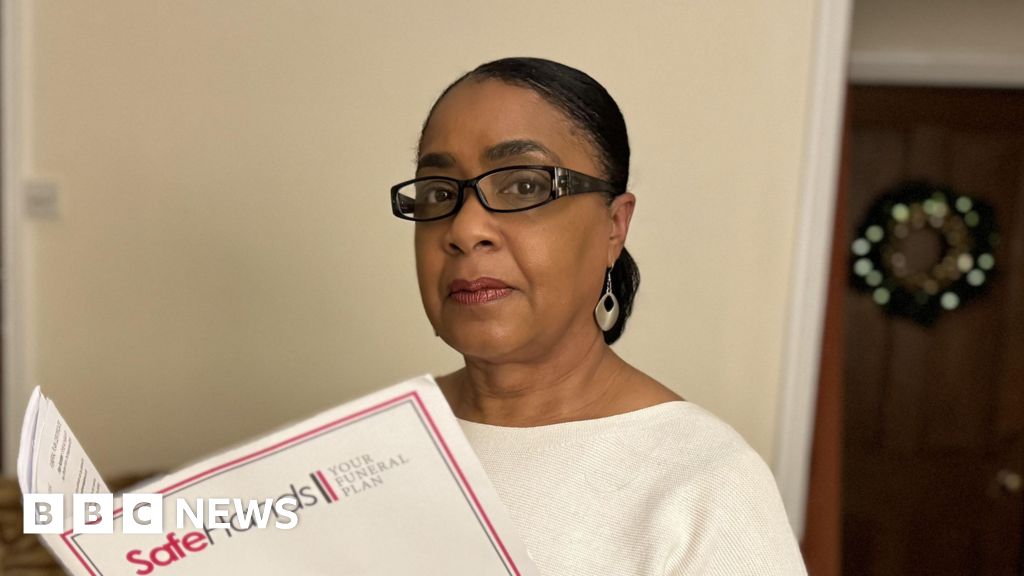
BBC Investigations, East Midlands
BBC News, East Midlands
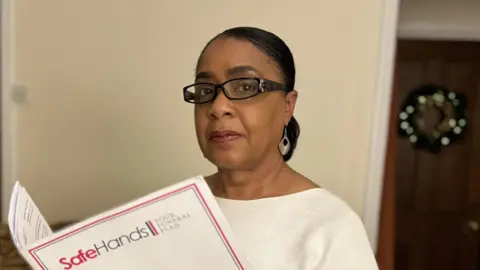 BBC
BBCPeople who lost thousands of pounds after the collapse of a pre-paid funeral firm have hit out at the “tiny” sums they are set to be repaid after three years of waiting.
Some 46,000 people invested in a fund to cover the future cost of their funerals with Safe Hands Plans Ltd before the company fell into administration in 2022.
The administrator for Safe Hands, FRP Advisory, has said planholders could receive initial repayments – of between 8.5p and 12.5p for every pound they lost – by the end of June.
“Getting some money back is better than nothing – but it’s a slap in the face,” Denise Hudson, who shelled out nearly £2,500, said.
The 58-year-old, from Derby, paid for a Safe Hands plan in 2017 after seeing the firm advertised on television, and said she thought her investment was “foolproof”.
She is among planholders who are owed an estimated £70.6m in total.
A major fraud investigation into the dealings of Safe Hands, and its parent company, SHP Capital Holdings Ltd, was launched in October 2023.
In October last year, in an update to creditors, FRP Advisory said there would be repayments.
Then, on 3 January, administrators confirmed planholders will get some money back – adding what people will get back is above the rate of 1p to 10p per each pound lost in typical administration cases.
But Ms Hudson said: “We paid in full. We need the full money back.
“We put our trust in people and we have all been let down.
“Everyone will still lose an awful lot.”
‘Just anger is left’
Ms Hudson said she had to deal with the death of her mother Daisy and brother Rupert in 2024 as she was trying to get her money back.
“[Mum] had a brilliant funeral plan and that saved us a lot of time, everything was set out,” she said.
“I thought that is what would happen with me.
“Nobody would have had to go to any trouble, everything would have been sorted out – but that wasn’t to be.”
She accused Safe Hands’s bosses of doing “an underhanded, ruthless thing”.
“It’s appalling they could take people’s hard-earned savings,” she added.
“I did think I had done everything right. I did do my homework.
“I felt embarrassed more than anything else – that I’d handed my money over and lost it. Now just anger is left.”

Since July 2022, pre-paid funeral providers have required approval to operate from the Financial Conduct Authority (FCA).
Safe Hands was one of dozens of companies operating in the previously unregulated sector, and collapsed four months before the measures came in.
In 2017, Sandie and David Beatty, from Bingham in Nottinghamshire, paid Safe Hands £3,395 to cover the funeral costs for the first of them to die.
Mrs Beatty, 73, said they felt “angry, disappointed, sick” when the firm collapsed.
“Compared to what we put in, what we’ll get back is a tiny amount,” she said.
“When we get it, it might be enough to buy a pizza, and we’ll have a little party.
“For us, it’s not about the money now. We just want someone to be held to account.
“Our money went somewhere.”
Mr Beatty, 80, said: “There’s nothing we can do about it. We want justice but realistically we won’t get our money back.
“People have been taken for a ride and that stings.”
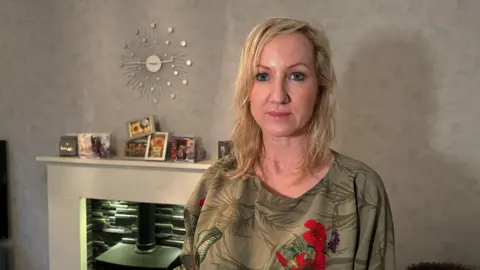
Aimee Geary, 50, from Anstey in Leicestershire, paid £3,000 to Safe Hands in 2017.
The NHS worker said she took out the plan because she thought funeral costs would rise in the future.
“I felt quite happy,” Ms Geary said. “Other people thought I was young [to be planning my funeral].
“They thought I was mad. I’m very organised, and I didn’t want anyone else to have a job when I’m not here.
“It’s sad that you try to plan something and it has been taken away from you.”
She was told, in 2022, she would probably get £1 out of every £100 back.
“I’m disappointed,” she added. “Somebody else has to now find the money and arrange my funeral when I’m not here because I would never buy another [funeral plan].”

Heather Mould, 77, and her partner Mike took out Safe Hands plans in 2017 – each paying £3,500.
Mrs Mould, from Allington in Lincolnshire, said: “It was quite a loss when you are on a pension.
“We were told we might get back 10p in the pound. It’s something, but it’s not a lot.
“I felt let down but we were pleased to find out before either of us had died so we could arrange something else.”
FRP told the BBC the Safe Hands administration case had been “complex” and had required extensive legal action both in the UK and abroad – including in the Cayman Islands – to trace funds that are due to creditors.
‘Significant loss’
It said it had so far recovered £11.4m for planholders and was focused on getting the best return for them.
FRP said it was “working towards” making an initial distribution to planholders before the end of the second financial quarter in June 2025, and had ringfenced a minimum of £1.6m to that end.
“While we understand the current estimated return of 8.5p to 12.5p in the pound still represents a significant loss to planholders, it’s important to note this exceeds the typical returns in administration cases, where unsecured creditors usually receive between 1p to 10p in the pound,” a spokesperson said.
The administrator said its continuing efforts were running parallel to the ongoing Serious Fraud Office (SFO) investigation.
 Getty Images
Getty ImagesThe spokesperson added: “We fully understand and deeply sympathise with the distress Safe Hands planholders are experiencing.
“The loss of funeral plan savings has created significant worry for many families, and we take our responsibility to recover funds for planholders extremely seriously.”
The SFO confirmed it was progressing an active criminal investigation into alleged fraud by Safe Hands Plans Limited and its parent company SHP Capital Holdings Limited.
A spokesperson said: “We recognise there is significant public interest in this case and are committed to sharing further information as soon as possible.”
Both former owners of Safe Hands – David Milson and Richard Philip Wells – were contacted for comment by the BBC but have not responded.
NewsBeat
Southport trial latest: Axel Rudakubana to be sentenced for murders of three girls at Taylor Swift dance class

Southport killer Axel Rudakubana is set to be sentenced on Thursday morning for murdering three young girls in a frenzied knife attack last year.
Rudakubana, 18, stabbed and killed the girls, aged between six and nine, with a 20cm-long kitchen knife as he ambushed a Taylor Swift-themed dance class in Southport, Merseyside.
Wearing a surgical face mask while armed with the blade, the then 17-year-old travelled five miles from his family home to the studio where he killed Alice da Silva Aguiar, Bebe King and Elsie Dot Stancombe.
As a trial was set to begin at Liverpool Crown Court on Monday, the teenager pleaded guilty to the murder of the three children as well as the attempted murders of eight others.
He also admitted production of a biological toxin and possession of information likely to be useful to a person committing or preparing to commit an act of terrorism. He also pleaded guilty to possession of a knife.
Back at Liverpool Crown Court on Thursday morning, he is set to be sentenced for a total of 16 charges.
Killer due to be sentenced
Southport killer Axel Rudakubana is due to be sentenced at Liverpool Crown Court in the morning.
Alice da Silva Aguiar, nine, Bebe King, six, and Elsie Dot Stancombe, seven, died following the attack at a Taylor Swift-themed class on July 29.
Rudakubana, 18, of Banks, Lancashire, on Monday admitted the murders, as well as the attempted murders of eight other children, who cannot be identified for legal reasons, class instructor Leanne Lucas and businessman John Hayes.
Jane Dalton22 January 2025 23:55
Editorial: Starmer right to push back on ‘cover-up’ claim
The rules on what can be disclosed before a court case are designed to ensure that victims get the justice they deserve:
Jane Dalton22 January 2025 21:55
Home secretary demands tech firms remove dangerous content accessed by killer
In case you missed it yesterday: Home secretary Yvette Cooper has put tech companies on notice, demanding they remove all dangerous content that was accessed by Axel Rudakubana in the lead-up to the Southport attacks.
“Companies should not be profiting from hosting content that puts children’s lives at risk”, she told the Commons.
Announcing a swath of reforms in the wake of the horrific attacks in Southport last year, Ms Cooper said ministers would be “contacting technology companies to ask them to remove dangerous material that he accessed”.
Jane Dalton22 January 2025 20:50
Knife sales crackdown divides commentators
Government critics say Sir Keir Starmer’s pledge to crack down on online knife sales is missing the point, many pointing to the failure of authorities to stop Southport killer Axel Rudakubana.
Reform leader Nigel Farage claimed: “The truth is there are murder weapons in every kitchen drawer. What we should be talking about is the total failure to stop this terrorist & the cover-up of information.”
But his former Ukip colleague Henry Bolton called for a ban on knives openly sold as “fashion accessories”.
Jane Dalton22 January 2025 16:40
Charities call for knife sales crackdown
Knife crime charities have demanded stricter regulation of online marketplaces, because “careless” retailers are making it too easy for young people to buy knives.
Patrick Green, chief executive of knife crime charity the Ben Kinsella Trust, said the tragedy in Southport showed “how careless the online marketplaces are”.
He added that the ease of online sales is “a damning indictment”, saying: “Retailers are just completely focused on making money and not protecting the public. The law has proved inadequate.
“We need to close the loophole that exists around online marketplaces.
“This isn’t an isolated incident. There have been a number of incidents like this.”
Bruce Houlder, founder of Fighting Knife Crime London, told the PA News Agency that knife crime was “more worrying than ever”.
He said: “I think there should be much tougher legislation. It’s foreseeable that these knives are going to be used to cause injury.”
Mr Houlder added there is “insufficient being done” to stop online retailers selling knives, calling them “complicit in the crimes that eventually get committed”.
Jane Dalton22 January 2025 15:40
No 10 could replicate porn access curbs for knife sales
Downing Street has indicated “nothing is off the table” to protect children when asked what actions would be taken to enforce Sir Keir Starmer’s promise of tougher rules on online knife sales.
The prime minister’s official spokesman was asked whether the government was happy to see how the Online Safety Act beds in before considering any further legislation.
He replied: “We have worked at pace to implement the Online Safety Act. Our message remains as the home secretary and technology secretary said yesterday. The social media companies should take action now. There is no need to wait for laws to kick in and the prospect of significant penalties.
“More broadly, we have been clear that nothing is off the table with keeping our children and communities safe.”
Asked whether measures aimed at verifying the age of children trying to access pornography could be replicated for knife sales, the spokesman said: “We are obviously looking at these plans and we will update urgently on how we will deliver on these plans in due course.”
Jane Dalton22 January 2025 15:10
NewsBeat
A23a: Giant iceberg on collision course with island

Climate and science reporter
Data journalist
 Getty Images
Getty ImagesThe world’s largest iceberg is on a collision course with a remote British island, potentially putting penguins and seals in danger.
The iceberg is spinning northwards from Antarctica towards South Georgia, a rugged British territory and wildlife haven, where it could ground and smash into pieces. It is currently 173 miles (280km) away.
Countless birds and seals died on South Georgia’s icy coves and beaches when past giant icebergs stopped them feeding.
“Icebergs are inherently dangerous. I would be extraordinarily happy if it just completely missed us,” sea captain Simon Wallace tells BBC News, speaking from the South Georgia government vessel Pharos.
 BFSAI
BFSAIAround the world a group of scientists, sailors and fishermen are anxiously checking satellite pictures to monitor the daily movements of this queen of icebergs.
It is known as A23a and is one of the world’s oldest.
It calved, or broke off, from the Filchner Ice Shelf in Antarctica in 1986 but got stuck on the seafloor and then trapped in an ocean vortex.
Finally, in December, it broke free and is now on its final journey, speeding into oblivion.
The warmer waters north of Antarctica are melting and weakening its vast cliffs that tower up to 1,312ft (400m), taller than the Shard in London.
It once measured 3,900 sq km, but the latest satellite pictures show it is slowly decaying. It is now around 3,500 sq km, roughly the size of the English county of Cornwall.
And large slabs of ice are breaking off, plunging into the waters around its edges.
A23a could break into vast segments any day, which may then hang around for years, like floating cities of ice cruising uncontrollably around South Georgia.
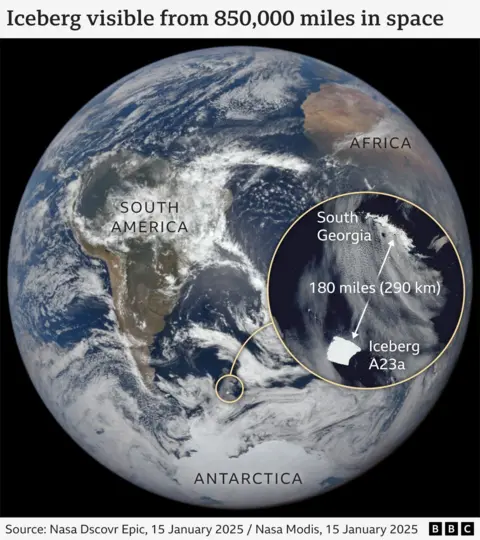
This isn’t the first huge iceberg to threaten South Georgia and Sandwich Islands.
In 2004 one called A38 grounded on its continental shelf, leaving dead penguin chicks and seal pups on beaches as massive ice chunks blocked their access to feeding grounds.
The territory is home to precious colonies of King Emperor penguins and millions of elephant and fur seals.
“South Georgia sits in iceberg alley so impacts are to be expected for both fisheries and wildlife, and both have a great capacity to adapt,” says Mark Belchier, a marine ecologist who advises the South Georgia government.
Sailors and fisherman say icebergs are an increasing problem. In 2023 one called A76 gave them a scare when it came close to grounding.
“Chunks of it were tipping up, so they looked like great ice towers, an ice city on the horizon,” says Mr Belchier, who saw the iceberg while at sea.
Those slabs are still lingering around the islands today.
“It is in bits from the size of several Wembley stadiums down to pieces the size of your desk,” says Andrew Newman from Argos Froyanes, a fishing company that works in South Georgia.
“Those pieces basically cover the island – we have to work our way through it,” says Captain Wallace.
The sailors on his ship must be constantly vigilant. “We have searchlights on all night to try to see ice – it can come from nowhere,” he explains.
A76 was a “gamechanger”, according to Mr Newman, with “huge impact on our operations and on keeping our vessel and crew safe”.
 Simon Wallace
Simon WallaceAll three men describe a rapidly changing environment, with glacial retreat visible year-to-year, and volatile levels of sea ice.
Climate change is unlikely to have been behind the birth of A23a because it calved so long ago, before much of the impacts of rising temperatures that we are now seeing.
But giant icebergs are part of our future. As Antarctica becomes more unstable with warmer ocean and air temperatures, more vast pieces of the ice sheets will break away.

Before its time comes to an end though, A23a has left a parting gift for scientists.
A team with the British Antarctic Survey on the Sir David Attenborough research vessel found themselves close to A23a in 2023.
The scientists scrambled to exploit the rare opportunity to investigate what mega icebergs do to the environment.
 Tony Jolliffe/BBC
Tony Jolliffe/BBCThe ship sailed into a crack in the iceberg’s gigantic walls, and PhD researcher Laura Taylor collected precious water samples 400m away from its cliffs.
“I saw a massive wall of ice way higher than me, as far as I could see. It has different colours in different places. Chunks were falling off – it was quite magnificent,” she explains from her lab in Cambridge where she is now analysing the samples.
Her work looks at what the impact the melt water is having on the carbon cycle in the southern ocean.
 Getty Images
Getty Images“This isn’t just water like we drink. It’s full of nutrients and chemicals, as well as tiny animals like phytoplankton frozen inside,” Ms Taylor says.
As it melts, the iceberg releases those elements into the water, changing the physics and chemistry of the ocean.
That could store more carbon deep in the ocean, as the particles sink from the surface. That would naturally lock away some of the planet’s carbon dioxide emissions that contribute to climate change.
Icebergs are notoriously unpredictable and no-one knows what exactly it will do next.
But soon the behemoth should appear, looming on the islands’ horizons, as big as the territory itself.
Politics
Reform’s new heartlands revealed as Farage’s party set to decimate Labour strongholds – is YOURS one?

Reform UK is set to detonate several key Labour strongholds with voters abandoning Keir Starmer in droves for Nigel Farage, an eye-opening map has revealed.
It comes after multiple national polls put Reform as the joint most popular party in Britain after Labour slashed winter fuel payments, taxed farmers, raised taxes and sparked market turmoil.
Today national pollsters MoreInCommon put Reform on 25 per cent, tied in first with the Conservatives as the most popular party.
Pollsters ElectionMapsUK have aggregated all national polls in a sophisticated mapping model, weighted for recency and historic pollster accuracy, and generated an electoral map of Britain.
It shows a whopping 76 seats flipping to Reform, with Farage’s party dominating in certain pockets of Britain, usually where Labour once held favour.
GB News has analysed the map and can reveal Reform’s new heartlands are the south-east around the Thames Estuary, the Midlands around Stoke, south Yorkshire and the coast of County Durham in England’s northwest.
EXPLORE: Reform’s projected heartlands

Reform’s English Heartlands
GBN
All these areas were dominated by Labour in the July 2024 election and have historically voted for Keir Starmer’s party.
In the Thames Estuary area, Reform is set to win 13 of 16 seats, with eight coming at Labour’s expense. In the northwest heartland, Farage’s party is projected to take nine of eleven seats, all from Labour.
In the midland’s heartland, Labour is set to lose nine seats to Reform, of a possible 14. And finally in south Yorkshire, Reform is tipped to win seven of 10 seats, also all from Labour.
Reform UK’s projected gains in these areas are all the more eye-opening because they are doing what opposition parties have tried to do for decades.
Take the Barnsley North constituency for example. Labour has won the seat since its creation in 1983, most recently triumphing with a 7,811 majority.
But the seat is now projected to flip to Reform in massive swing to Farage’s party.
The story is similar in Hartlepool where Labour has won since 1974, with the exception of a brief Tory triumph in a 2021 by-election.
The seat is now set to go to Reform in a hefty 12.4 per cent swing.

Farage has been voted the most popular politician in the country in a damning assessment of Starmer’s premiership
NIGEL FARAGE
It comes as speculation around a possible by-election in disgraced MP Mike Amesbury’s seat intensifies.
The Labour MP pleaded guilty in court last week after a video showing him sucker punching a constituent in a late night bust up was posted online.
Amesbury is yet to resign and trigger a by-election, however. If he receives a custodial or suspended sentence, a recall petition will be offered to his constituents asking if they want another election.
If 10 per cent of eligible voters sign the petition, a by-election would be called, something Labour will be dreading.
Reform UK has been campaigning hard in the seat over the Christmas period in preparation for a by-election, distributing election material and knocking on doors.
Reacting to the research, a Reform UK spokesman said: “This research tells us what we all know, Reform UK has all the momentum in British politics.
“We are surging in the polls and our membership is growing daily. Thanks to this surge in membership, we have more activists than ever before ready to campaign for the May elections.
“We are reconstituting the centre-right of British politics, the Tory brand is broken and Reform are now the real opposition.”
LATEST FROM MEMBERSHIP:
 PICTURED: Mike Amesbury arrives at Chester Magistrates’ CourtPA
PICTURED: Mike Amesbury arrives at Chester Magistrates’ CourtPAFULL BREAKDOWN
Heartland One – Thames Estuary
Reform gains
Sittingbourne and Sheppey / Labour / Kevin McKenna
Rochester and Strood / Labour / Lauren Edwards
Gillingham and Rainham / Labour / Naushabah Khan
Chatham and Aylesford / Labour / Tristan Osborne
Dartford / Labour / Jim Dickson
Bexleyheath and Crayford / Labour / Daniel Francis
Dagenham and Rainham / Labour / Margaret Mullane
Hornchurch and Upminster / Conservative / Julia Lopez
Thurrock / Labour / Jen Craft
South Basildon and East Thurrock / Reform / James McMurdock
Castle Point / Conservative / Rebecca Harris
Rayleigh and Wickford / Conservative / Mark Francois
Basildon and Billericay / Conservative / Richard Holden
Heartland Two – Midlands around Stoke
Reform gains
Stoke-on-Trent North / Labour / David Williams
Stoke-on-Trent Central / Labour / Gareth Snell
Burton and Uttoxeter / Labour / Jacob Collier
Cannock Chase / Labour / Josh Newbury
Tamworth / Labour / Sarah Edwards
North Warwickshire and Bedworth / Labour / Rachel Taylor
Nuneaton / Labour / Jodie Gosling
Birmingham Hodge Hill and Solihull North / Labour / Liam Byrne
Walsall and Bloxwich / Labour / Valerie Vaz
Heartland Three – Northwest Coast
Reform Gains
South Shields / Labour / Emma Lewell-Buck
Sunderland Central / Labour / Lewis Atkinson
Houghton and Sunderland South / Labour / Bridget Phillipson
Easington / Labour / Grahame Morris
Hartlepool / Labour / Jonathan Brash
Bishop Auckland / Labour / Sam Rushworth
North Durham / Labour / Luke Akehurst
Washington and Gateshead South / Labour / Sharon Hodgson
Heartland Four – South Yorkshire
Reform Gains
Pontefract, Castleford and Knottingley / Labour / Yvette Cooper
Normanton and Hemsworth / Labour / Jon Trickett
Doncaster East and the Isle of Axholme / Labour / Lee Pitcher
Rotherham / Labour / Sarah Champion
Rawmarsh and Conisbrough / Labour / John Healey
Barnsley South / Labour / Stephanie Peacock
Barnsley North / Labour / Dan Jarvis
NewsBeat
Calls to tackle drug driving ‘epidemic’ with drivers failing half of roadside tests

There have been calls to tackle the “growing epidemic” of drug driving with half of motorists failing roadside drug tests.
In 2023, 51 per cent of drivers pulled over for a roadside drug test were found to be positive. In the first seven months of 2024 that figure was 49 per cent, according to road safety charity IAM RoadSmart.
This information is based on data from 17 out of 45 police forces across the UK in response to Freedom of Information requests.
Drug-driving rules consist of very low limits for eight illegal drugs such as cocaine and cannabis, risk-based limits for eight drugs that have a medical use, and a separate approach to amphetamines that aims to balance legitimate medical use with abuse.
Roadside swab tests identify whether a motorist has used cannabis or cocaine.
The presence of other drugs is identified via blood and urine tests at police stations.
Police officers must have a reasonable suspicion that a driver is under the influence of drugs before asking them to take a test.
More than 3,000 people were caught drug-driving on four or more occasions in the 11 years to July 20 2024.
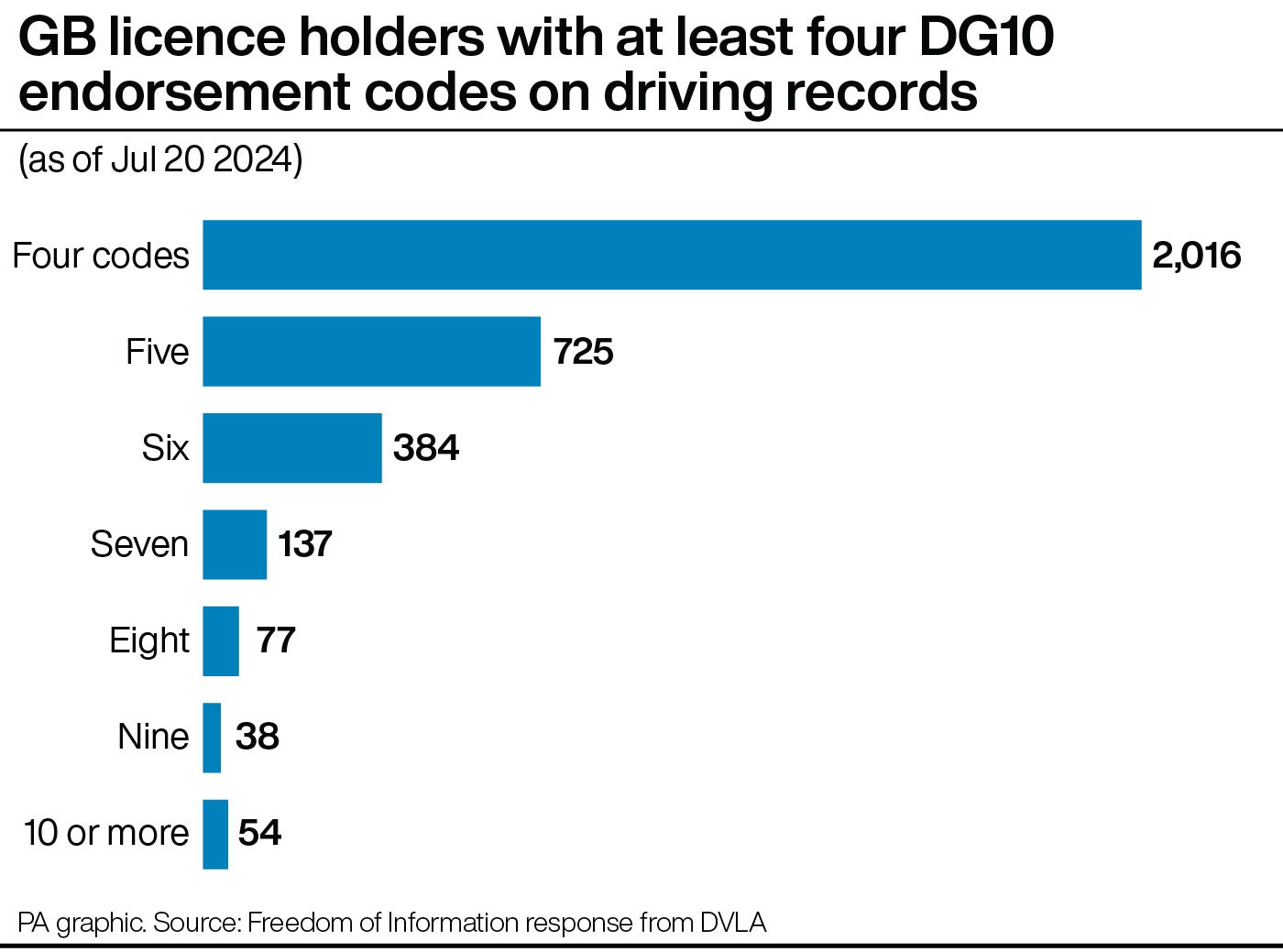
Department for Transport (DfT) figures show the number of people killed in crashes on Britain’s roads when a driver was impaired by drugs rose from 55 in 2014 to a record 134 in 2023.
In October 2024, Shaun Mulligan, then 48, of Seaside in Eastbourne, East Sussex, was given a five-year prison sentence and disqualified from driving for seven-and-a-half years after admitting causing death by careless driving while over the limit for drugs and alcohol.
He crashed a scaffolding van into a car travelling in the opposite direction on the A281 near Henfield, West Sussex, in November 2022, killing its 71-year-old driver, Jennifer Allen.
Mulligan tested positive for benzoylecgonine – the chemical breakdown of cocaine – and was nearly double the drink-drive alcohol limit.
IAM RoadSmart policy manager William Porter said: “The fact that one in two motorists are failing roadside drugs tests shows that the message about the dangers of drug-driving is not getting through.
“Separate research by IAM RoadSmart indicates that one in seven drivers aged 17-34 admitted to getting behind the wheel after taking Class A drugs, indicating how vital it is to tackle this growing epidemic.
“We urgently need a new approach to combat drug-driving which focuses on both greater enforcement and establishing rehabilitation courses to reduce reoffending.
“The evidence shows that those taking equivalent drink-drive courses are almost three times less likely to reoffend than those who don’t.
“Ministers must consider expanding similar courses to those with drug-driving convictions.”
Transport Secretary Heidi Alexander recently hinted that drug-driving rules could be toughened as part of a road safety strategy being developed by the Government.
A DfT spokesperson said: “We take road safety extremely seriously and there are already strict penalties in place for those who are caught drug-driving.
“Our roads are among the safest in the world, but we are committed to improving road safety and reducing the number of those killed and injured on our roads.”
NewsBeat
Harry's 'historic' court win and 'We can sea you, Vlad'

Thursday’s headlines cover the Duke of Sussex’s settlement and the spotting of a Russian spy ship.
Politics
International students could be offered visas to stay in Scotland in new economic push by First Minister

International students who graduate in Scotland could be offered dedicated visas to encourage them to stay in Scotland beyond their studies, if the UK Government agrees to cooperate.
Scottish First Minister John Swinney unveiled the proposal during a speech focussed on opportunities for economic growth in front of a room full of business leaders and representatives from Higher Education at JP Morgan Chase in Glasgow.
He signalled three key focuses for his government in harnessing Scotland’s energy potential, growing the population and forming closer relationships with the European Union.
Flanked by recent graduates starting out their careers at JP Morgan Chase, the First Minister recognised the need for “urgent action, clarity of purpose and collective endeavour”.

International students who graduate in Scotland could be offered dedicated visas to encourage them to stay in Scotland beyond their studies, if the UK Government agrees to cooperate
Getty/ GB News
He said: “Maximising the economic and community benefit from our massive energy wealth, acting now to address our looming population crisis and committing ourselves once again to Europe and its single market is essential for the wellbeing of our society and the future success of the economy.”
To tackle Scotland’s chequered past of graduate retention, the ‘Scottish Graduate Visa’ would be linked to a Scottish tax code and be based on a requirement to work and live in Scotland.
The two-year visa is designed to give international graduates two more years of skilled work within their areas of expertise, acting as a bridge before to gain the necessary experience to apply for a Skilled Worker Visa.
Migration is not a devolved issue and is therefore reserved to Westminster, so Swinney has called on the UK Government to cooperate.
In 2005, the UK and Scottish Labour governments introduced the ‘Fresh Talent: Working in Scotland’ scheme – another post-graduate visa route for international students that was replaced by a UK wide scheme before being stopped in 2012.
Eluding to Scotland’s growing concern over an ageing population, Swinney said: “We need a new focus on an immigration policy that works for Scotland.
“We need people to come here, to live and work to bolster our working age population.
“We need them to address skill shortages and to increase our productivity and our innovation.
“They’re welcome for who they are, for the contribution they will make to our land, their distinct perspective, their hopes and their ambitions, but have no doubt, they are essential for tax revenues and sustainability of our public services like our National Health Service and the future successes of your businesses, as paid employees or paying customers.”
With regards to setting his Government’s sights on closer ties with the EU, the First Minister said that his aim wasn’t to look backwards and reopen the Brexit debate, but to strengthen ties with the bloc.
“Simply put, ‘Remain’ was the past; ‘Rejoin’ is Scotland’s best hope for a more prosperous future,” he said.
He hopes to move towards a veterinary agreement with the EU to lower the barriers to trade for Scottish produce.
In March 2024, the Scottish Government announced exports of Scottish fruit and meat to the EU fell by 59 per cent and 29 per cent respectively, compared to the equivalent period in 2020.
Secretary of State for Scotland, Ian Murray, has already prioritised the advancement of ‘Brand Scotland’ within his remit, placing his drive for Scottish produce within close proximity to the First Minister.

Scottish First Minister John Swinney unveiled the proposal during a speech focussed on opportunities for economic growth in front of a room full of business leaders and representatives from Higher Education at JP Morgan Chase in Glasgow
GB News
However, given Keir Starmer’s repeated commitment to “make Brexit work” for Britain, ambitions of rejoining the EU are unlikely to spread south any time soon.
Answering questions from the media and business representatives, Mr Swinney was inevitably quizzed on the President Trump resuming office and what they could mean for Scotland.
“I’ve made no secret of the fact that I am alert to the danger of tariffs and the damage that could do to the Scottish whisky industry,” he said.
“There is absolutely no alternative but for me to engage with the US Administration led by President Trump, should those circumstances arise.”
President Trump’s first term saw a 25% tariff fall on Scotch whisky imports during the last 18 months of his tenure, estimated by the Scotch Whisky Association to have cost the industry £600 million.
Should such a tariff be placed on more one of Scotland’s most profitable exports to the United States, it would surely put a star-spangled spanner in the First Minister’s economic ambitions.
NewsBeat
Britons now favour European allies over US as ‘unpredictable’ Trump returns, study finds
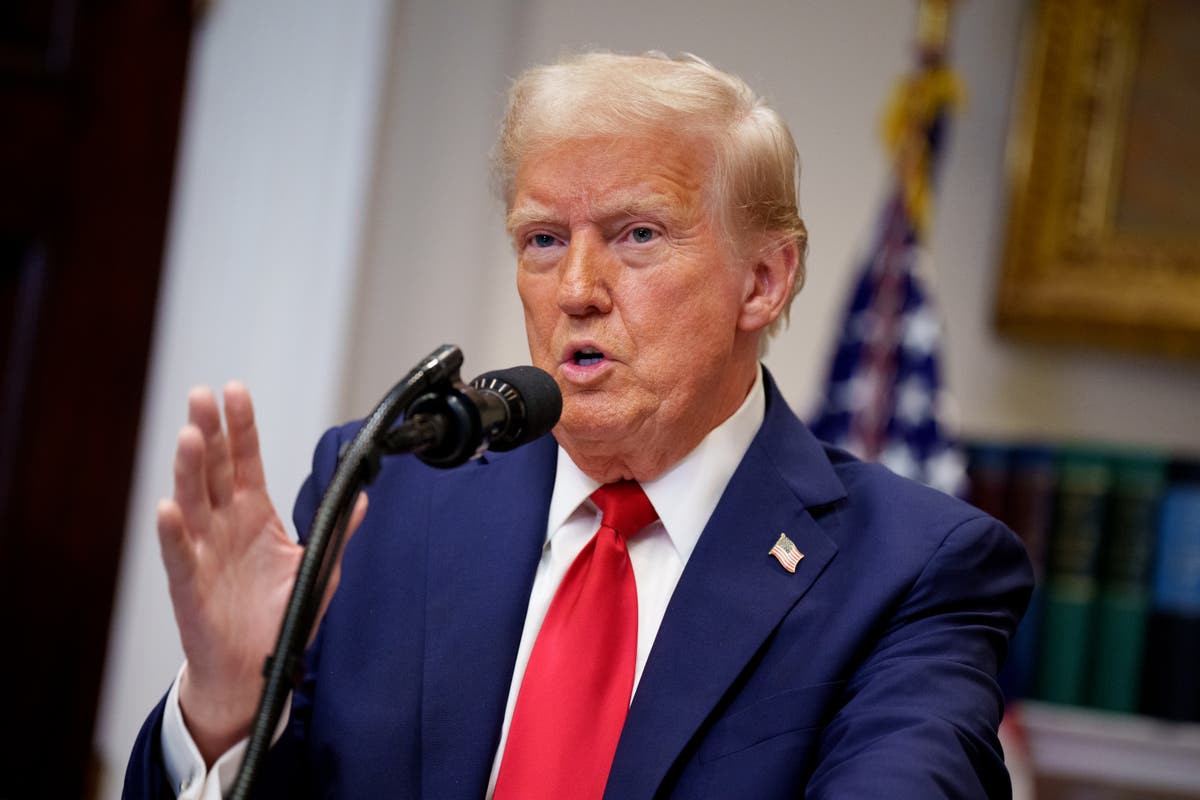
Britons now favour Europe over the United States as an ally, a new study has found, marking a complete reversal of public opinion from almost 60 years ago.
The study, by the Policy Institute at King’s College London, found that a majority of 53 per cent now say Britain should prioritise Europe, compared with 31 per cent who say the opposite – an almost mirror image of opinion back in 1967, when the public favoured America over Europe by 53 per cent to 33 per cent.
Professor Bobby Duffy, director of KCL’s Policy Institute, said the shift is related to both the “febrile and unpredictable political atmosphere around the re-election of President Trump” and “the many years building closer ties to Europe since the 1960s.”
It comes amid fears that the president’s plans to introduce tariffs and instigate a trade war will force Britain to choose between striking a trade deal with the incoming US president and continuing to pursue closer ties with the EU in a planned reset of Britain’s relationship with the bloc.

But in December, Sir Keir Starmer rejected demands that he make a choice between a trade deal with the US and closer relations with the EU, saying such a suggestion is “plain wrong”.
Meanwhile, insiders this week told The Independent that Mr Trump’s new administration believes it has Sir Keir’s government “over a barrel” on trade as Britain becomes increasingly reliant on a US trade deal.
Senior sources in the president’s team said the UK had no choice but to seek a trade agreement after the prime minister said his government’s success would be judged primarily on economic growth.
Despite the public generally being in favour of Europe, Reform UK voters have a marked commitment to America, with 55 per cent to 31 per cent saying Britain should side with the US over Europe if it ever had to choose between them as allies.
By contrast, Conservative voters are much more closely divided, with 43 per cent backing America and 40 per cent backing Europe.
Labour voters, however, heavily prefer Europe with just 23 per cent choosing the US and 65 per cent siding with Europe.
The polling comes just days after Nigel Farage travelled to Washington DC for the inauguration of Donald Trump, a close ally of the Reform UK leader.
The research – relying on data conducted by Focaldata in December 2024 and data from historic polls – also says the public are now almost twice as likely to say they’d prefer the UK to be more like Sweden and Switzerland (51 per cent) instead of trying be a leading world power (28 per cent).
“These long-term trends remind us how much we’ve changed, with UK public opinion being shaped by decades of national and global politics.
“We have moved away from seeing the US as key allies in the 1960s, which won’t just be related to the febrile and unpredictable political atmosphere around the re-election of President Trump, but also to the many years building closer ties to Europe since the 1960s”, Professor Duffy said.
He added: “Some of these international uncertainties, as well as perhaps increased realism in our global standing, mean most would now prefer Britain take a lower profile on the world stage, following Sweden or Switzerland’s example, rather than trying to be a leading power.”
Mr Farage and right-wing Tories, including Boris Johnson, flew into Washington this week for Mr Trump’s inauguration – but the British Labour government largely watched the festivities from afar.
The Reform UK leader was asked by members of Mr Trump’s team to speak at events around the inauguration and hosted a glitzy champagne-fuelled party for the incoming president.
Ahead of the inauguration, he was proclaimed “the next prime minister of Great Britain” at the party which was a coming together of top Maga conservatives with Reform UK, Brexiteers and top Tories.
The polling, which surveyed 1,033 UK adults, was conducted by Focaldata between December 11 and 12 2024.
NewsBeat
Deloitte Money League: Real Madrid top, Man City second, Man Utd fourth

Aston Villa enter the top 20 after competing in Europe last season for the first time since 2011.
Nine Premier League clubs are in the top 20, with Arsenal, Liverpool, Tottenham, Chelsea, Newcastle and West Ham retaining their places.
Lyon are the only other new club, with Napoli and Eintracht Frankfurt dropping out.
A further five Premier League clubs are in the top 30, with Brighton 21st after competing in the Europa League for the first time in their history.
Crystal Palace, Everton, Fulham and Wolves are ranked 26th to 29th.
Revenues for the top 20 clubs rose by 6% to a record £9.47bn.
Matchday revenue was the fastest growing revenue stream, rising by 11% to £1.77bn, helped by an increase in stadium capacity, ticket prices and premium hospitality.
Real benefited most from an increase in matchday revenues, generating £210m – double last year’s figure – after renovation of their Bernabeu Stadium.
Barcelona dropped from fourth to sixth after a £53m fall in matchday revenue, with games played at a smaller stadium while the Nou Camp is redeveloped.
Commercial revenue remained the largest revenue source in the Money League, rising 10% to £4.14bn and accounting for 44% of total revenue, helped by the hosting of non-football live events such as concerts.
“Money League clubs continue to break records with ongoing growth in commercial and matchday revenues,” said Tim Bridge, lead partner in the Deloitte sports business group.
Total broadcast revenue remained at £3.64bn because each of the big five leagues – the Premier League, Spain’s La Liga, German Bundesliga, France’s Ligue 1 and Italy’s Serie A – are in the same domestic broadcast cycle.
*Figures converted from euros may differ from previously reported figures because of a change in currency exchange rates
Politics
Keir Starmer scolded for ‘bizarre rabbit hole of blame’ over Axel Rudakubana failings: ‘A real cover-up!’

The head of a leading think tank has accused Prime Minister Sir Keir Starmer of going down a “bizarre rabbit hole” of blame in his response to the Southport attack case.
Alan Mendoza, Executive Director of the Henry Jackson Society, told GB News he was “puzzled” by Starmer’s approach to the failings that led to Axel Rudakubana’s deadly rampage.
Mendoza criticised the Prime Minister for focusing on social media and Amazon rather than addressing the multiple occasions authorities could have intervened.
“It would have been quite easy for the Prime Minister to make a decision to say, ‘look, we messed up, the authorities messed up, it wasn’t on my watch, I promise to do better’,” Mendoza said.
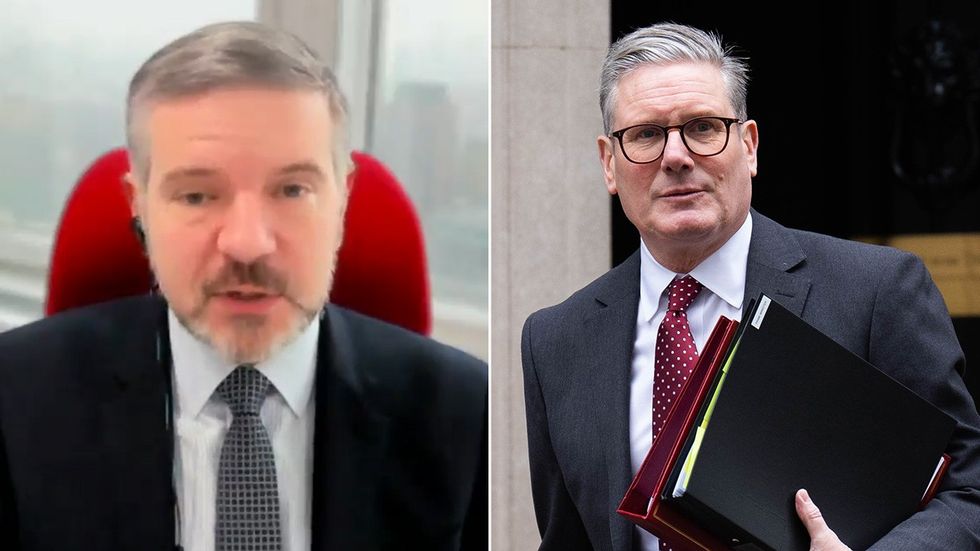
Mendoza hit out at Prime Minister Keir Starmer’s blame of Amazon in Axel Rudakubana’s case
GB News / PA
The Southport attacker had purchased the murder weapon from Amazon without significant barriers, when he was 17-years-old.
In response to the attack, Prime Minister Sir Keir Starmer has announced stricter measures for online knife purchases, requiring two forms of identification.
Mendoza claimed there was a “real cover-up” of crucial information about the attacker in the aftermath of the incident.
He specifically criticised the Government’s decision to withhold key information about Rudakubana’s activities.
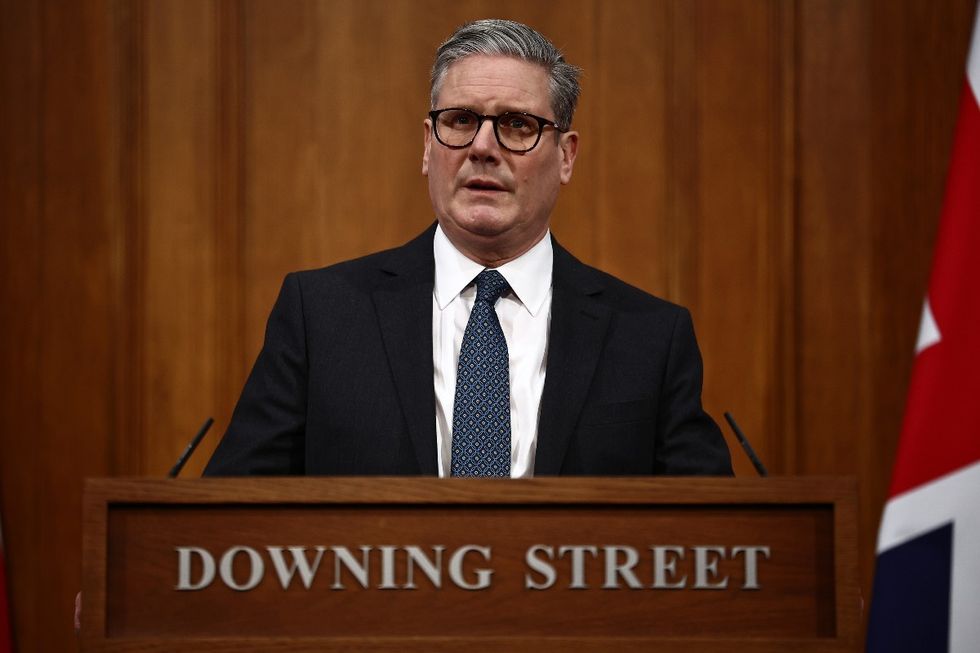
Keir Starmer has defended his actions after being blasted for Southport ‘cover-up’
PA
“You knew things about al-Qaeda training manuals, you knew he was watching beheading videos, you knew that he had an interest in all these activities and was talking about ricin back in August,” he told GB News.
LATEST DEVELOPMENTS:
He argued this information could have been revealed within days of the crime. The think tank director suggested earlier disclosure might have prevented subsequent unrest.
“Had that come out, I think they would have defused a lot of the pressures out there, where people felt there was a real cover up going on,” he said.
“It turns out they were right, there was a cover up going on,” Mendoza added.
Starmer has recently warned that Britain faces a new threat from “young men in their bedrooms” accessing radical materials online.

Mendoza told GB News that there was a ‘cover up’ of information relating to Rudakubana
GB News
“Terrorism has changed,” the Prime Minister said. “Now, alongside that we also see acts of extreme violence perpetrated by loners, misfits, young men in their bedroom.”
The new requirements for buying knives online will mandate that buyers provide documents such as a passport or driving licence, along with a live video verification of their age.
Amazon has responded to the incident by launching an urgent investigation, stating they take their responsibility around age-restricted items “extremely seriously.”
The online retailer confirmed they use ID verification services to check personal details and require age verification upon delivery.
-

 Fashion8 years ago
Fashion8 years agoThese ’90s fashion trends are making a comeback in 2025
-

 Entertainment8 years ago
Entertainment8 years agoThe Season 9 ‘ Game of Thrones’ is here.
-

 Fashion8 years ago
Fashion8 years ago9 spring/summer 2025 fashion trends to know for next season
-

 Entertainment8 years ago
Entertainment8 years agoThe old and New Edition cast comes together to perform You’re Not My Kind of Girl.
-

 Sports8 years ago
Sports8 years agoEthical Hacker: “I’ll Show You Why Google Has Just Shut Down Their Quantum Chip”
-
Business8 years ago
Uber and Lyft are finally available in all of New York State
-
Entertainment8 years ago
Disney’s live-action Aladdin finally finds its stars
-
Sports8 years ago
Steph Curry finally got the contract he deserves from the Warriors
-
Entertainment8 years ago
Mod turns ‘Counter-Strike’ into a ‘Tekken’ clone with fighting chickens
-
Fashion8 years ago
Your comprehensive guide to this fall’s biggest trends





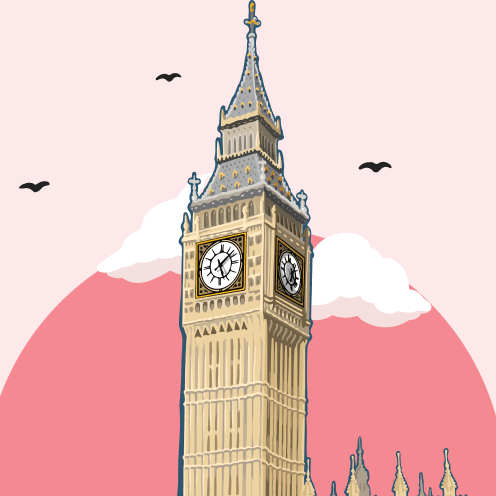



You must be logged in to post a comment Login